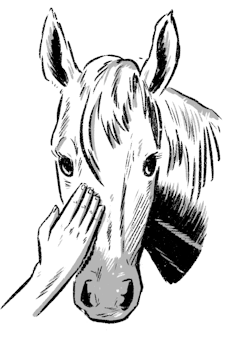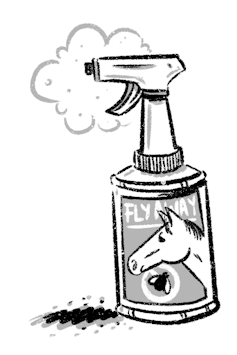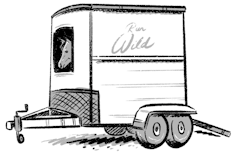10 things we do that puzzle and scare horses
- Written by Paul McGreevy, Professor of Animal Behaviour and Animal Welfare Science, University of Sydney
Horses, like our dogs and cats, are familiar to many of us, be they racehorses, police horses, or much-loved pony club mounts. So it might surprise you that horses, in Australia, are more deadly than snakes, and indeed all venomous animals combined.
An equine veterinarian is more at risk of workplace injury than a firefighter. Does horses’ apparent familiarity lead us to misinterpret or misunderstand their behaviour?
Read more: 8 things we do that really confuse our dogs
Some of our interactions with horses correspond to interactions between horses themselves. Giving our horse a scratch on an itchy spot or allowing them to rub their head against us, while frowned on by some trainers, mimics how horses behave together.
But there are many other interactions which, from the horse’s perspective, are unusual or downright rude.
The culture clash between horses and humans can trigger defence or flight responses that can leave us badly injured. Here are ten common challenges we present to horses:
1. Invasive veterinary care
There are many veterinary practices we impose on horses to keep them healthy. Some of them, such as injecting or suturing, are invasive or painful. Horses’ natural reaction to pain is to flee. If they can’t, they may resort to aggression, such as biting or kicking.
Horses don’t know veterinary treatments are meant to help them, and hence vets who treat horses are at more risk of injury than those treating other species. Equine vets sustain more workplace injuries than construction workers or firefighters.
 Wes Mountain/The Conversation, CC BY-ND
2. Patting them
Many horse people routinely pat their horses as a reward for a job well done. But horses have not evolved to find this rewarding. They don’t pat each other – instead, they scratch or gently nibble each other as a form of bonding.
A recent study showed patting increased horses’ heart rates, whereas scratching lowered them and was associated with behavioural signs of relaxation and enjoyment.
3. Picking up feet, hoof trimming and shoeing
An important task in horse-keeping is hoof care through regular cleaning, trimming or shoeing. This requires us to pick up a horse’s foot and hold it aloft for several minutes. This practice of immobilising the hoof restricts the horse’s ability to flee if it perceives a threat, which may be why many horses find hoof-handling stressful. Training a horse to accept having its feet and legs held requires patience to prevent injury to both the horse and the handler.
Read more:
Dressing up for Melbourne Cup Day, from a racehorse point of view
4. Grooming sensitive areas
Horses in groups regularly groom each other, favouring areas that aren’t sensitive or ticklish. We like to groom our horses all over. Grooming the sensitive groin, inguinal and perineal regions is likely to be unpleasant for horses. This may account for the tail-swishing, agitation and even biting of the handler often seen when people groom these taboo areas.
5. Pulling or clipping hairs and whiskers
Many horse owners like to impose strict order on their horses’ body hair, including pulling out “excess” hair from the mane and tail, and trimming or removing body hair, facial whiskers and the protective hair inside the ears. These activities are frequently resented by horses. Some European countries have banned whisker trimming altogether because of the importance of whiskers to horses in detecting the proximity of surfaces and foraging outside their field of view.
Wes Mountain/The Conversation, CC BY-ND
2. Patting them
Many horse people routinely pat their horses as a reward for a job well done. But horses have not evolved to find this rewarding. They don’t pat each other – instead, they scratch or gently nibble each other as a form of bonding.
A recent study showed patting increased horses’ heart rates, whereas scratching lowered them and was associated with behavioural signs of relaxation and enjoyment.
3. Picking up feet, hoof trimming and shoeing
An important task in horse-keeping is hoof care through regular cleaning, trimming or shoeing. This requires us to pick up a horse’s foot and hold it aloft for several minutes. This practice of immobilising the hoof restricts the horse’s ability to flee if it perceives a threat, which may be why many horses find hoof-handling stressful. Training a horse to accept having its feet and legs held requires patience to prevent injury to both the horse and the handler.
Read more:
Dressing up for Melbourne Cup Day, from a racehorse point of view
4. Grooming sensitive areas
Horses in groups regularly groom each other, favouring areas that aren’t sensitive or ticklish. We like to groom our horses all over. Grooming the sensitive groin, inguinal and perineal regions is likely to be unpleasant for horses. This may account for the tail-swishing, agitation and even biting of the handler often seen when people groom these taboo areas.
5. Pulling or clipping hairs and whiskers
Many horse owners like to impose strict order on their horses’ body hair, including pulling out “excess” hair from the mane and tail, and trimming or removing body hair, facial whiskers and the protective hair inside the ears. These activities are frequently resented by horses. Some European countries have banned whisker trimming altogether because of the importance of whiskers to horses in detecting the proximity of surfaces and foraging outside their field of view.
 Wes Mountain/The Conversation, CC BY-ND
6. Spraying them with chemicals such as flyspray
Spraying fly repellent is common enough for many humans. But it creates a strange noise and may also be perceived as aversive when it lands on sensitive skin. The strong scent of the chemicals can also be aversive to horses, given their highly sensitive sense of smell. Patient training is often needed to counter-condition horses so they stand quietly while being sprayed.
7. Feeding by hand or from a bucket
As grazers, horses do not feed each other (except when nursing foals) and in free-roaming situations, aggression over food is rare. In contrast, food aggression is often seen in domestic horses. We provide highly palatable foods and treats that can bring out unwelcome behaviours because horses are highly motivated to eat these foods.
Some learn to mug their carers, for example by knocking the feed bucket out of their hands. In such a situation, crime really does pay and the horse can swiftly learn to repeat the behaviour. Of course, the horse’s confusion increases and its welfare plummets if it is punished for this.
Wes Mountain/The Conversation, CC BY-ND
6. Spraying them with chemicals such as flyspray
Spraying fly repellent is common enough for many humans. But it creates a strange noise and may also be perceived as aversive when it lands on sensitive skin. The strong scent of the chemicals can also be aversive to horses, given their highly sensitive sense of smell. Patient training is often needed to counter-condition horses so they stand quietly while being sprayed.
7. Feeding by hand or from a bucket
As grazers, horses do not feed each other (except when nursing foals) and in free-roaming situations, aggression over food is rare. In contrast, food aggression is often seen in domestic horses. We provide highly palatable foods and treats that can bring out unwelcome behaviours because horses are highly motivated to eat these foods.
Some learn to mug their carers, for example by knocking the feed bucket out of their hands. In such a situation, crime really does pay and the horse can swiftly learn to repeat the behaviour. Of course, the horse’s confusion increases and its welfare plummets if it is punished for this.
 Wes Mountain/The Conversation, CC BY-ND
8. Putting them in a trailer or horse box
Horses are claustrophobic and have 320° vision, so our practice of loading them into dark, narrow spaces with unstable footing, such as into trailers (floats) and horse boxes, is often a challenge for a species that has evolved to avoid such spaces. Difficulties with loading and with dangerous behaviours during transport are routinely reported. These responses are generally manifestations of panic and include rushing off the trailer and pulling back when tied up.
9. Branding
Searing a permanent mark onto the skin of horses is often required for identification purposes. The use of super-cooled brands or firebrands is unpleasant because they cause a third-degree burn and require the horse to be restrained, either in stocks or via chemical sedation. Thankfully, less invasive methods of identification, such as microchipping, are gaining increasing acceptance among breed and competition societies.
10. Stabling and other forms of isolation
Putting horses in stables might seem benign, and many horses voluntarily enter stables because that is where they are fed. But stabling prevents horses from engaging in most of their grazing and social behaviours. Horses rarely voluntarily isolate themselves from other horses, and prolonged social isolation can lead to behavioural problems such as separation distress, rug-chewing and stereotyped behaviours such as weaving and stall-walking.
Read more:
Is your horse normal? Now there’s an app for that
If you’d like to benchmark your horse or pony against thousands of others that we have gathered data on, consider using the Equine Behavior Assessment Research Questionnaire. Understanding why horses find so many procedures unpleasant, frightening or painful is the first step to cutting them some much-needed slack.
They do not defend themselves out of malice but from fear. Taking a walk in their hooves allows us to make them happier and safer to be around.
Wes Mountain/The Conversation, CC BY-ND
8. Putting them in a trailer or horse box
Horses are claustrophobic and have 320° vision, so our practice of loading them into dark, narrow spaces with unstable footing, such as into trailers (floats) and horse boxes, is often a challenge for a species that has evolved to avoid such spaces. Difficulties with loading and with dangerous behaviours during transport are routinely reported. These responses are generally manifestations of panic and include rushing off the trailer and pulling back when tied up.
9. Branding
Searing a permanent mark onto the skin of horses is often required for identification purposes. The use of super-cooled brands or firebrands is unpleasant because they cause a third-degree burn and require the horse to be restrained, either in stocks or via chemical sedation. Thankfully, less invasive methods of identification, such as microchipping, are gaining increasing acceptance among breed and competition societies.
10. Stabling and other forms of isolation
Putting horses in stables might seem benign, and many horses voluntarily enter stables because that is where they are fed. But stabling prevents horses from engaging in most of their grazing and social behaviours. Horses rarely voluntarily isolate themselves from other horses, and prolonged social isolation can lead to behavioural problems such as separation distress, rug-chewing and stereotyped behaviours such as weaving and stall-walking.
Read more:
Is your horse normal? Now there’s an app for that
If you’d like to benchmark your horse or pony against thousands of others that we have gathered data on, consider using the Equine Behavior Assessment Research Questionnaire. Understanding why horses find so many procedures unpleasant, frightening or painful is the first step to cutting them some much-needed slack.
They do not defend themselves out of malice but from fear. Taking a walk in their hooves allows us to make them happier and safer to be around.
Authors: Paul McGreevy, Professor of Animal Behaviour and Animal Welfare Science, University of Sydney
Read more https://theconversation.com/10-things-we-do-that-puzzle-and-scare-horses-143675


















